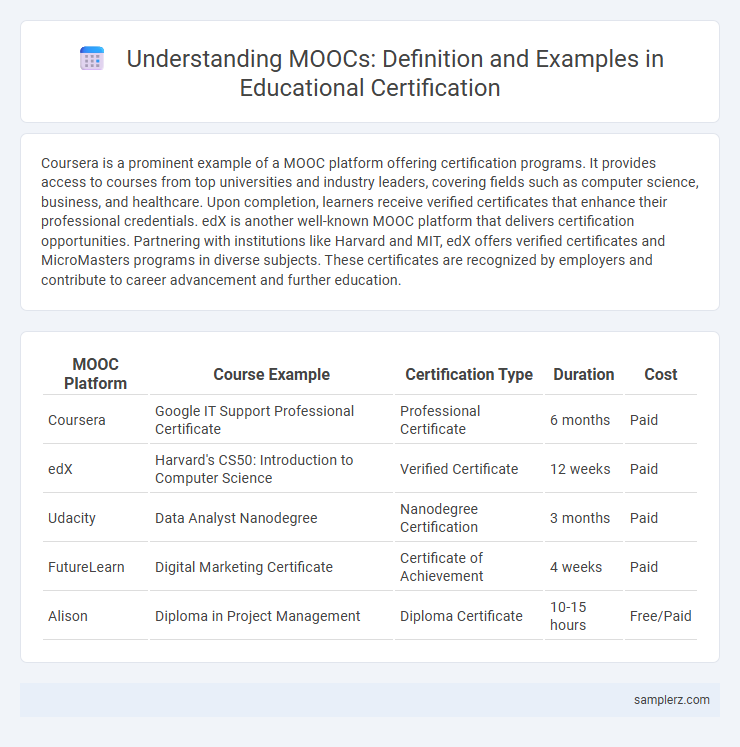Coursera is a prominent example of a MOOC platform offering certification programs. It provides access to courses from top universities and industry leaders, covering fields such as computer science, business, and healthcare. Upon completion, learners receive verified certificates that enhance their professional credentials. edX is another well-known MOOC platform that delivers certification opportunities. Partnering with institutions like Harvard and MIT, edX offers verified certificates and MicroMasters programs in diverse subjects. These certificates are recognized by employers and contribute to career advancement and further education.
Table of Comparison
| MOOC Platform | Course Example | Certification Type | Duration | Cost |
|---|---|---|---|---|
| Coursera | Google IT Support Professional Certificate | Professional Certificate | 6 months | Paid |
| edX | Harvard's CS50: Introduction to Computer Science | Verified Certificate | 12 weeks | Paid |
| Udacity | Data Analyst Nanodegree | Nanodegree Certification | 3 months | Paid |
| FutureLearn | Digital Marketing Certificate | Certificate of Achievement | 4 weeks | Paid |
| Alison | Diploma in Project Management | Diploma Certificate | 10-15 hours | Free/Paid |
Top MOOC Platforms Offering Certification
Coursera leads among top MOOC platforms offering certification, partnering with universities like Stanford and Yale to provide accredited courses in data science, business, and AI. edX, founded by Harvard and MIT, offers professional certificates and MicroMasters programs that enhance career prospects. Udacity specializes in nano-degree programs focused on technology and programming skills, collaborating with industry leaders such as Google and IBM.
Popular MOOCs with Industry-Recognized Certificates
Coursera offers popular MOOCs such as Google IT Support Professional Certificate and IBM Data Science Professional Certificate, both widely recognized by industry leaders. edX provides MicroMasters programs from institutions like MIT and Harvard, delivering credentials valued by employers for advanced expertise. Udacity's Nanodegree programs, particularly in fields like artificial intelligence and cybersecurity, are highly regarded for practical skills and industry-aligned certifications.
Coursera: Leading MOOC Certifications
Coursera offers a wide range of MOOC certifications that are highly recognized by employers and academic institutions worldwide. Its professional certificates, such as Google IT Support and IBM Data Science, provide practical skills and industry-relevant knowledge through flexible online courses. Coursera's partnerships with top universities like Stanford and Yale ensure high-quality content and valuable credentials for career advancement.
edX: Verified Certificates for Professional Growth
edX offers Verified Certificates that provide learners with credible recognition of their skills and knowledge, enhancing professional growth and career advancement. These certificates are available for a wide range of courses from prestigious institutions like Harvard, MIT, and Berkeley, demonstrating mastery in specialized fields. Earning a Verified Certificate through edX can significantly improve job prospects by validating competencies to employers in competitive industries.
Udacity’s Nanodegree Programs Explained
Udacity's Nanodegree Programs offer specialized certification in fields like data science, artificial intelligence, and programming, designed in collaboration with industry leaders such as Google and IBM. These MOOCs provide project-based learning, real-world case studies, and mentor support to enhance skill acquisition and career readiness. Completion of a Nanodegree signals verified competency and practical experience, making it a valuable credential for technology-driven job markets.
FutureLearn: Accredited Online Certification Courses
FutureLearn offers accredited online certification courses in various fields such as healthcare, business, and technology, partnering with leading universities and institutions worldwide. These MOOCs provide recognized credentials that enhance professional qualifications and career advancement opportunities. The platform's flexible learning options and expert-led content ensure accessible, high-quality education tailored for diverse learners.
Google Career Certificates on MOOC Platforms
Google Career Certificates on MOOC platforms offer industry-recognized credentials in high-demand fields such as IT support, data analytics, project management, and UX design. These programs provide flexible, affordable online courses developed by Google experts, enabling learners to gain practical skills and accelerate career advancement. Earning a Google Career Certificate often leads to job opportunities with top employers who actively seek certified professionals from these MOOC-based programs.
Harvard Online: Prestigious MOOC Certifications
Harvard Online offers prestigious MOOC certifications through platforms like edX, providing access to high-quality courses in fields such as data science, computer science, and business. These certifications hold significant value due to Harvard's global reputation and rigorous curriculum standards. Earning a certification from Harvard Online can enhance professional credentials and career opportunities worldwide.
MOOC Specializations for Skill Enhancement
MOOC specializations such as Coursera's Google IT Support Professional Certificate offer targeted skill enhancement through a series of interconnected courses culminating in a recognized certification. These programs provide practical knowledge in areas like data science, digital marketing, and software development, enabling learners to build expertise and improve job readiness. Employers increasingly value certifications from platforms like edX, Udacity, and Coursera for validating professional competencies acquired via MOOCs.
Comparing Free vs. Paid MOOC Certifications
Coursera and edX offer MOOCs with certification options that vary between free and paid tracks, where free courses typically provide audit-only access without official certificates, while paid options include verified certificates recognized by employers and institutions. The value of paid MOOC certifications is enhanced by features such as graded assignments, proctored exams, and professional credentials, whereas free certifications may lack such validation and comprehensive support. Choosing between free and paid MOOC certifications depends on learners' goals, with paid courses offering greater credibility and potential career benefits.

example of MOOC in certification Infographic
 samplerz.com
samplerz.com